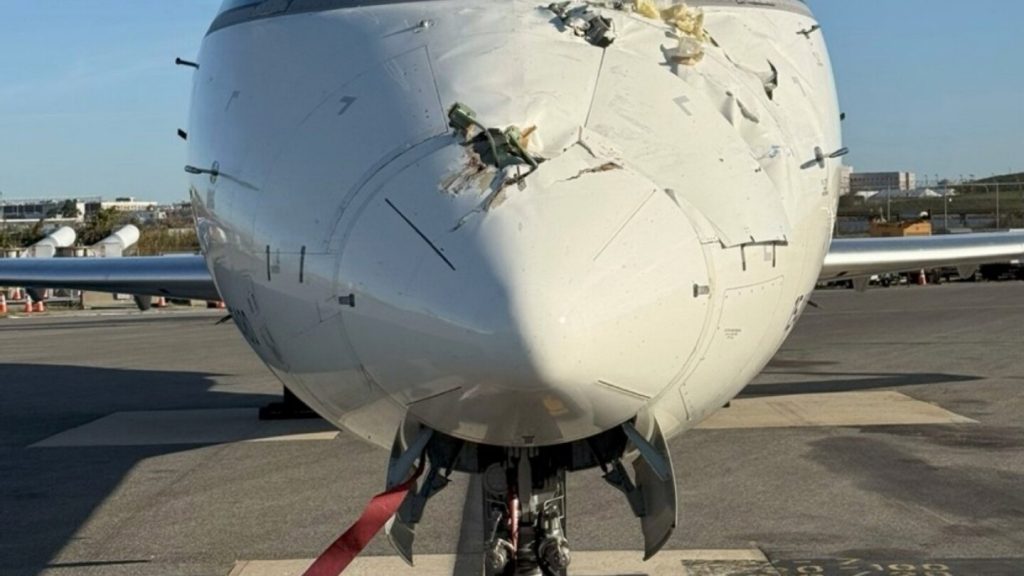Listen to the article
A preliminary report from the National Transportation Safety Board released Thursday reveals that the captain of one of two Delta Air Lines regional jets involved in a collision at LaGuardia Airport last month told investigators he did not recall hearing instructions to yield to the other aircraft.
The incident occurred on October 1 when the wing of an aircraft preparing for takeoff to Roanoke, Virginia, struck the front of another plane that was taxiing after arriving from Charlotte, North Carolina. The low-speed collision at the intersection of two taxiways injured a flight attendant and caused significant damage to both aircraft—gouging the nose and shattering the cockpit window of one plane while damaging the wing of the other.
Flight 5155, bound for Roanoke with 32 people aboard, collided with Flight 5047, which had arrived from Charlotte carrying 61 passengers and crew. The NTSB report, while not citing a definitive cause for the collision, provides initial details about communication between air traffic control and the flight crews.
According to the preliminary findings, ground controllers had instructed the crew of the outbound Flight 5155 to “give way” to another aircraft on the ground. While the flight crew read back these instructions—a standard procedure to confirm receipt of air traffic control communications—the captain later told investigators he didn’t recall hearing the instruction to yield.
The captain explained that at the time, he was focused on calculating performance numbers for landing, a routine but concentration-intensive task. Despite the previously acknowledged instructions, the plane began to taxi forward.
“The captain recalled he was looking down into the cockpit to visually verify the airplane trim setting as part of the checklist, and when he looked up he saw flight 5047 to the right,” the NTSB report states.
When the captain finally noticed the other aircraft, he attempted to veer left to avoid a collision. Simultaneously, the captain of Flight 5047 applied brakes immediately before impact, but these last-second maneuvers proved insufficient to prevent the collision.
The incident highlights ongoing concerns about ground safety at major airports, where congestion and complex taxiway systems require precise communication and attention from both air traffic controllers and flight crews. While runway incursions receive significant attention in aviation safety, taxiway collisions represent another risk area in airport ground operations.
Delta Air Lines has declined to comment specifically on the preliminary report, stating only that they are fully cooperating with the investigation. The airline, which operates hundreds of regional flights daily through its connection carriers, has maintained a generally strong safety record in recent years.
The NTSB’s final report, which typically takes months to complete, will provide a more comprehensive analysis of the factors contributing to the collision, including potential procedural, communication, or human factor issues. Aviation safety experts note that such incidents often result from a chain of events rather than a single failure point.
LaGuardia Airport, one of the busiest and most constrained airports in the United States, handles over 30 million passengers annually despite its relatively small footprint. The airport’s complex taxiway layout and high traffic volume require exceptional coordination between controllers and pilots.
The investigation is continuing as authorities work to determine the full circumstances surrounding the collision and develop potential safety recommendations to prevent similar incidents in the future.
Fact Checker
Verify the accuracy of this article using The Disinformation Commission analysis and real-time sources.




4 Comments
The NTSB report provides some important initial details, but I’m curious to learn more about the factors that led to this collision. Was it a training issue, a communications breakdown, or something else? Proactive steps to address the root causes are crucial to uphold high safety standards in the industry.
This incident highlights the importance of clear communication and situational awareness for pilots. It’s concerning that the Delta pilot reportedly did not recall the instructions to yield. Proper training and protocols are crucial for aviation safety.
Hmm, the details in the NTSB report seem concerning. Not recalling instructions to yield is a serious issue that could have led to a much worse outcome. I hope the investigation uncovers the root causes to prevent similar incidents in the future.
Ground collisions like this can be very dangerous, even at low speeds. I’m glad to hear the injuries were relatively minor, but this is still a troubling incident that warrants a thorough investigation. Clear communication between pilots and air traffic control is paramount for aviation safety.